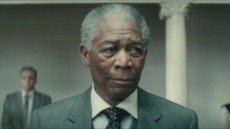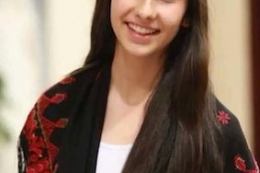Film: Invictus

Morgan Freeman as Mandela
Invictus means 'unconquered'. However, the film's title comes from a poem of 1975 by William Ernest Henley, a poem Nelson Mandela relied on during his 27 years internment on Robben Island, especially its final lines, 'master of my fate, captain of my soul'. Mandela was certainly invictus in his surviving prison and invictus in his election as president of South Africa.
This is a Clint Eastwood film. Eastwood will be 80 in May. During his 70s he has made a string of fine films, Mystic River, Million Dollar Baby, Flags of Our Fathers, Letters from Iwo Jima, Changeling and Gran Torino, an extraordinary effort and one marked by themes of forgiveness, a seemingly far cry from his Dirty Harry days. Eastwood is a master storyteller and, in his older age, has not shied away from significant themes.
As Invictus opens, Mandela is being released from prison in 1990. Eastwood uses television-reporting style of filming not only to indicate the historic moment being recorded but to enable the audience to accept Morgan Freeman as Nelson Mandela for the rest of the film. While he looks like Morgan Freeman and he sounds like Morgan Freeman and has Morgan Freeman's gravitas, we readily accept that it is Nelson Mandela, the historical person, that we are watching.
In retrospect, as journalist John Carlin does in his book, Playing the Enemy, on which the film is based, it seems a master stroke of politics and humanity (as Mandela notes several times) to bring black and white people together supporting the national rugby union team when South Africa is hosting the rugby world cup in 1995. The sequences where the meeting of football supporters vote to eliminate the colours and the name of the Springboks and Mandela himself comes to tell them not to because it is depriving the Afrikaaners of something they value (which they had done to the blacks) but to use that for uniting people indicates his shrewdness and vision. The sequence where he persuades his black security officer to accept former white police, from Special Branch, into the bodyguard squad is similarly powerful.
The portrait of Mandela is glowing though the rift with his wife and family, his indefatigably driven work ethic, are indicated.
Matt Damon plays Francois Pinaar, the captain of the Springboks, who, with example in leadership and the encouragement of the president, urges his team on to a surprising victory. Again, the suggestion of Mandela that the team go to the townships and coach the black youth despite the wariness and ignorance of the conditions on the part of some of the team, works wonders and, on television, is a coup for public relations.
The final match against New Zealand's All Blacks is presented in all its rough and tumble ('soccer is a gentlemen's game played by hooligans and Rugby is a hooligans game played by gentlemen') though whether it would convert any American audience to the code is probably a 'no'.
With Mandela and with the Truth and Reconciliation Commission, 1990s South Africa, despite economic and social difficulties, despite the high crime rate, showed the world that hatred and revenge were understandable but futile - that is the spirit of Invictus. The poem reveals the experience of Mandela on Robben Island.
Invictus
Out of the night that covers me,
Black as the Pit from pole to pole,
I thanks whatever gods may be
For my unconquerable soul.
In the fell clutch of circumstances
I have not winced or cried aloud.
Under the bludgeonings of chance
My head is bloody but unbowed.
Beyond this place of wrath and tears
Looms but the Horror of the shade,
And yet the menace of the years
Finds and shall find me unafraid.
It matters not how straight the gate,
How charged with punishments the scroll,
I am the master of my fate:
I am the captain of my soul.


















